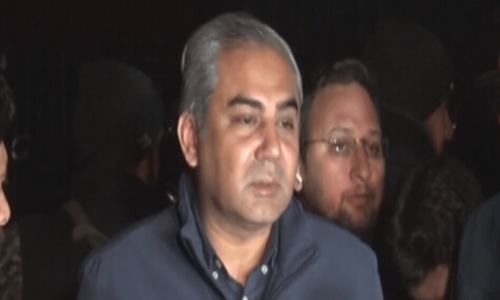THAT politicians and political parties have to invest money to win elections is known and understood. But Imran Khan and his party PTI are discovering that proving that victory was stolen from them also carries a cost.
The PTI has paid tens of thousands of rupees to Nadra, the National Database Registration Authority, to verify the votes cast in three of the four constituencies in Punjab which they had challenged in the election tribunals after the May 2013 general election.
Nadra is to check the votes polled in NA-118, NA-122 and NA-125 in Lahore, the stronghold of the Sharif brothers and their party PML-N. The fourth challenge concerned NA-110 constituency in Sialkot district.
Nadra is to match the thumb impression of voters on the ballot paper and on counterfoils and the photograph of the voter with his or her CNIC number on the election papers. It has been given one month to finish the work.
PTI and its chairman feel the scrutiny will reveal “the real picture of the voting pattern”. Political analysts, on the other hand, say Nadra’s findings will determine the shape of “the decisive phase” that Imran Khan said PTI’s legal and street battles against the PML-N government will enter.
Contrary to doubts raised in the past about verifying the legitimacy of polled votes through thumb impressions, Nadra is said to have the technical capacity.
Former Nadra Chairman Tariq Malik, who some say fell victim to the controversy, claims that the organisation is equipped to verify thumb impressions, however, it will cost Rs10 per ballot paper to do so. The PTI has paid this amount to Nadra.
Dawn contacted political figures, legal experts, serving and former officers of the Election Commission of Pakistan to ask about the possible scenarios emerging from the scrutiny. According to them PTI may come to know that proving “rigging” in election is far more difficult and complicated than leveling the charge. But Imran Khan appears confident that the Nadra scrutiny will prove his party’s claim that “massive rigging” took place in the last elections.
“We at Nadra are to determine whether the fingerprints on a ballot paper and its counterfoil belong to the same person, not who got how many votes,” said a Nadra official.
However, he agreed that reports about missing counterfoils, poor quality of ink used during voting, and incongruous thumb impressions would make the authority’s job difficult.
The job, he said, is made more difficult by the fact that the inquiry involves the PTI chairman and National Assembly Speaker Ayaz Sadiq.
Imran Khan visited the Nadra chairman the other day to impress upon him that “the gravity of the task required diligence and non-partisanship”. No need to impress that the authority which runs Nadra is controlled by the ruling PML-N.
How the findings of the Nadra could affect results of three constituencies in question?
Kanwar Dilshad would have been familiar with such games and fears as a former secretary of the Election Commission. He says the declared results of the three constituencies will “surely become controversial” in case Nadra finds a significant number of thumb impressions unverifiable.
“Of course, the judgment lies with the election tribunals, but it will be difficult for a judge to decide against a Nadra certified fact,” he said.
Speaker Ayaz Sadiq attempted to keep Nadra out of the voter scrutiny, but failed. The PML-N circles are certain that the PTI chief will not be able to win through his legal battle what he lost in the 2013 electoral battle.
PML-N supporters hold that the Nadra, at most, could report “many irregularities of fingerprints” which cannot be taken as evidence that PML-N or its candidates were “involved in deliberately rigging” the election.
A Supreme Court lawyer felt that since it is the first time that such evidence is being used to prove the charge of rigging, “the election tribunals will be extra careful in writing their judgments”. For him the case remains wide open and could take any direction.
Meanwhile, Imran Khan and his party PTI insist that the mere mismatch of fingerprints for “a considerable number of voters” on the ballot papers and counterfoils with the national identity card number would be enough evidence to prove that the elections were conducted in a fraudulent manner.
“We don’t need the election tribunal decreeing the election results of NA-122,” a member of PTI’s core committee told Dawn, on the condition of anonymity.
“The acceptance that many irregularities were found during the verification of thumb impressions of voters would be more than enough for us to re-launch our protest movement,” he added.
Imran Khan has also announced that the PTI would return to the streets if the judicial commission it has demanded to probe the 2013 elections is not constituted. And he is confident that the Nadra’s inquiry will force the government to do so.
Whether this happens or not, the conflict over alleged rigging will remain a part of the national political discourse until the next general elections. And only resolution to this conflict could lead much needed electoral reforms and a more meaningful election in the coming years.
Published in Dawn March 13th, 2015
On a mobile phone? Get the Dawn Mobile App: Apple Store | Google Play












































